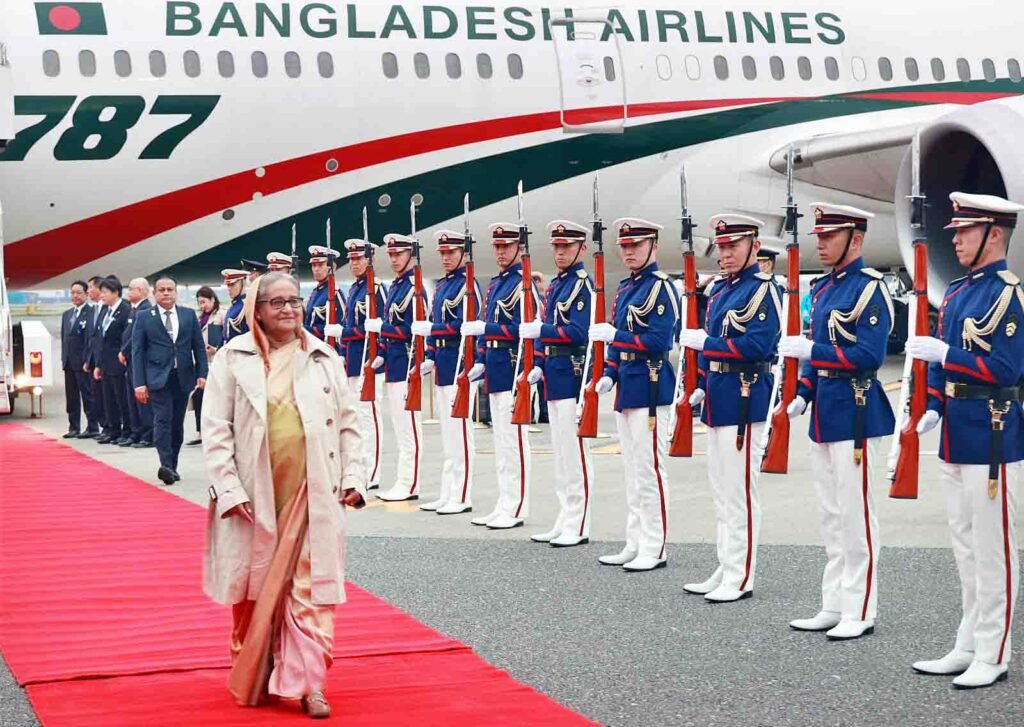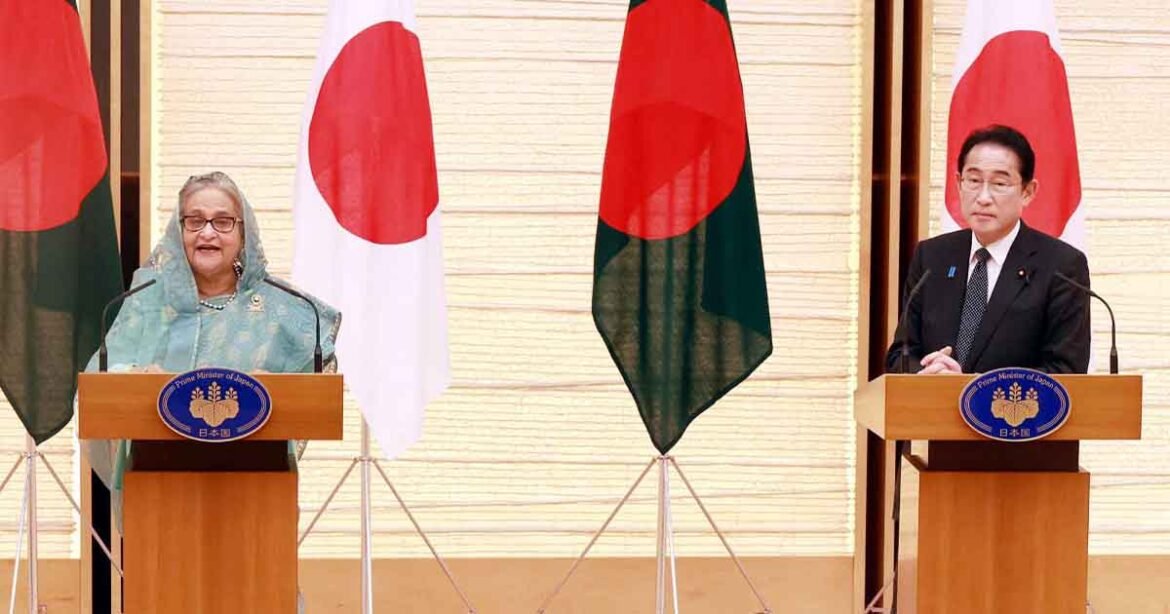The recent trip to Japan by Prime Minister Sheikh Hasina was worthwhile since it sought to revitalize bilateral cooperation and aid both countries in navigating the current economic situation.
From April 25th to April 28th, Bangladeshi Prime Minister Sheikh Hasina traveled to Japan at the invitation of her Japanese counterpart Fumio Kishida. This visit is important for both countries because the relationship between Bangladesh and Japan is not a typical example of friendly relations between two nations.
You can also read: Why US-South Korea agreed a key nuclear weapons deal?
It is a remarkable example of a steadfast and time-honored partnership that transcends the conventional definition of friendship. In addition, this relationship exemplifies how the synergy of global cooperation and economic diplomacy may stimulate remarkable developments.
First day: A grand welcome of PM Sheikh Hasina
The Bangladeshi premier arrived at Haneda International Airport in Tokyo on the 25th of April at approximately 4:45 pm local time (BD time 1:45 pm), where she was received by Japanese State Minister of Foreign Affairs Kenji Yamada. Prime Minister Sheikh Hasina’s arrival in Tokyo was greeted with a red carpet and a static guard of honor at the airport. PM Hasina was transported from the airport to the Akasaka Palace.

Second day: MoUs and Strategic partnerships
PM Sheikh Hasina began the second day of her four-day state visit to Japan with a variety of engagements, including meetings with Japanese Emperor Naruhito at the Imperial Palace, Japanese Foreign Minister Yoshimasa Hayashi, the chairman of the Bangladesh-Japan Committee for Commercial and Economic Cooperation, the president of JICA, the chairman of JETRO, and the president of the Bangladesh Friendship Parliamentary League.
On April 26, PM Hasina paid a courtesy call to the Emperor of Japan, Naruhito, and a guard of honor was presented to the Bangladesh Prime Minister. The meeting concluded with a dinner hosted at the residence of the Japanese prime minister in honor of Bangladesh prime minister Sheikh Hasina.

Bangladesh-Japan singed eight MoUs
Eight documents were signed between Dhaka and Tokyo on the second day of PM Sheikh Hasina’s four-day official visit. Concerned parties from the two friendly nations signed agreements on agriculture, metro rail, industrial improvement, ship recycling, customs matters, intellectual property, defense cooperation, ICT and cyber security cooperation. Later, Bangladesh and Japan exchanged the instruments in the presence of their respective premiers at the Office of the Prime Minister in Tokyo.
A beginning of strategic partnership
Bangladesh and Japan are seeking to establish a new path forward in their economic partnership, and the visit of Prime Minister Sheikh Hasina to Japan is a defining moment in the expansion of their economic ties. Prime Minister Sheikh Hasina stated, “Prime Minister Kishida and I have discussed today the entire gamut of our bilateral relations. We are happy that Bangladesh and Japan have successfully elevated the bilateral relations to a “Strategic Partnership” from the existing “Comprehensive Partnership”.
She added, “Today, Prime Minister Kishida and I concluded the Joint Statement on “Strategic Partnership”. I am confident that the excellent understanding, friendship and cooperation that exist between our two peoples and our governments would grow even stronger in the years ahead.”
“Our two sides have signed – agreements and memorandums which will further institutionalize our future cooperation in the areas of agriculture, customs matters, defense, ICT and cyber-security, industrial upgrading, intellectual property, ship recycling and metro rail,” the Bangladeshi premier said.
The other discussed topics
During the bilateral discussions, the Rohingya issue was discussed along with MIDI (Moheshkhali-Matarbari Integrated Infrastructure Development Initiative), BIG-B (The Bay of Bengal Industrial Growth Belt), and Economic Partnership. The BIG-B initiative, which aims to transform South Asia’s economic perspective, can help Bangladesh become the economic hub of the region and a gateway to Southeast Asia.
PM Hasina stated that they also discussed the MIDI and BIG-B Initiatives for the development of Southern Bangladesh in order to connect the Bay of Bengal with the surrounding regions. “We thank the Government of Japan for being our one of the largest development partners. We are looking forward to conclude an Economic Partnership Agreement (EPA) in the days ahead,” she said.
PM Hasina stated that they discussed the Rohingya crisis, as the Rohingyas’ prolonged presence in Bangladesh has severely impacted the lives and livelihoods of local communities. “We requested Japan to help finding a durable solution to the crisis by using its channel of communication with Myanmar,” she said.
This year, Dhaka and Narita will begin direct flights, according to the Prime Minister of Bangladesh. “We are happy to announce that the Dhaka-Narita direct flight is going to operate within this year,” she said.
Third day: Business, Culture, Science and Honouring Freedom Fighters
The Bangladesh Securities and Exchange Commission (BSEC), the Bangladesh Investment Development Authority (BIDA), and the Japan External Trade Organization (JETRO) hosted a business summit in Tokyo on April 27, where PM Sheikh Hasina delivered the keynote address.
PM urges Japanese businesspeople to explore opportunities in Bangladesh
Prime Minister Sheikh Hasina urged Japanese business leaders to explore the business and investment opportunities that await them in Bangladesh.
“We shall keep on improving the business environment and ensure a level playing field for you all to do businesses in Bangladesh,” she said.
“The number of Japanese companies operating in Bangladesh has gone up steadily in the last few years especially since 2014 when we entered into our ‘comprehensive partnership’, and Japan’s commitment under the Big-B initiative,” the premier added.
PM Hasina stated that she is confident that Japanese businesspeople are also following this upward trend and would be receptive to expanding or establishing new businesses in Bangladesh.
“I want to assure you that my government and all relevant agencies are keen to help you and our other friends from Japan in business endeavors in Bangladesh,” she said. In light of the exemplary results of the bilateral relations between the two countries over the past five decades, Bangladesh expects Japan to increase its presence in Bangladesh in the coming years, she said. “We have already resolved a number of regulatory and policy issues raised by Japanese companies in Bangladesh,” she continued.
Japan to establish children’s library in Dhaka
Tadao Ando Architect and Associates, founded by renowned architect Tadao Ando, signed a memorandum of understanding on the same day to construct a children’s library in Dhaka with Japanese funding. This was revealed when Tadao’s delegation met with PM Sheikh Hasina at Akasaka Palace.
PM Hasina honors the Japanese liberation war participants
On the same day, four Japanese citizens received the “Friend of Liberation War Honour” from prime minister Sheikh Hasina for their participation in Bangladesh’s 1971 Great War of Liberation. Prime Minister Sheikh Hasina paid a heartfelt tribute to the Japanese who fought during the Great War of Liberation of Bangladesh, expressing her optimism that the new generation will continue the ‘lasting friendship’ and ‘enviable partnership’ between the two nations in the coming years.
“I am confident that the people of Japan will always be on our side besides the government as they did in our need in the past. Our lasting friendship and enviable partnership over the past fifty years will be carried forward by our new generation in the years to come,” she said.

PM visits Japanese national museum of science
Prime Minister Sheikh Hasina also paid a visit to Tokyo’s Miraikan in the Amoi, Koto-ku neighborhood to learn more about Japan’s cutting-edge science and technology. She was cordially welcomed by the museum’s authorities upon her entrance.
PM Hasina was informed of how the human race may survive in an environmentally friendly manner. In addition, she was briefed on how carbon dioxide emissions, plastic, and other human actions endanger the lives of humans and other animals on the planet, as well as the means to survive. Additionally, the Bangladesh Prime Minister witnessed an exhibition of the spacecraft.
She also attended an event hosted by Bangladeshi expatriates and Japanese residents in the evening.
The last day of the visit
The Bangladeshi prime minister was scheduled to meet with Akie Abe, the wife of the late former Japanese prime minister Shinzo Abe. In addition, the national broadcaster of Japan, NHK, will soon air an interview with Prime Minister Sheikh Hasina.
This was the sixth journey to Japan made by Prime Minister Sheikh Hasina. During her visit, the prime minister was accompanied by her sister Sheikh Rehana, foreign minister AK Abdul Momen, agriculture minister Abdur Razzaque, prime minister’s private industry and investment adviser Salman F Rahman, state minister for foreign affairs Md Shahriar Alam, state minister for power, energy and mineral resources Nasrul Hamid, and state minister for information and communication Zunaid Ahmed Palak, as well as the relevant high level government officials.
On 28th April, PM Hasina left Tokyo in a flight from the United Airlines for Washington DC to attend a ceremony commemorating the 50-year partnership between Bangladesh and the World Bank. The flight is scheduled to land at Dallas International Airport around 3:50 pm (US time).
Cover photo by: Yeasin Kabir Joy


